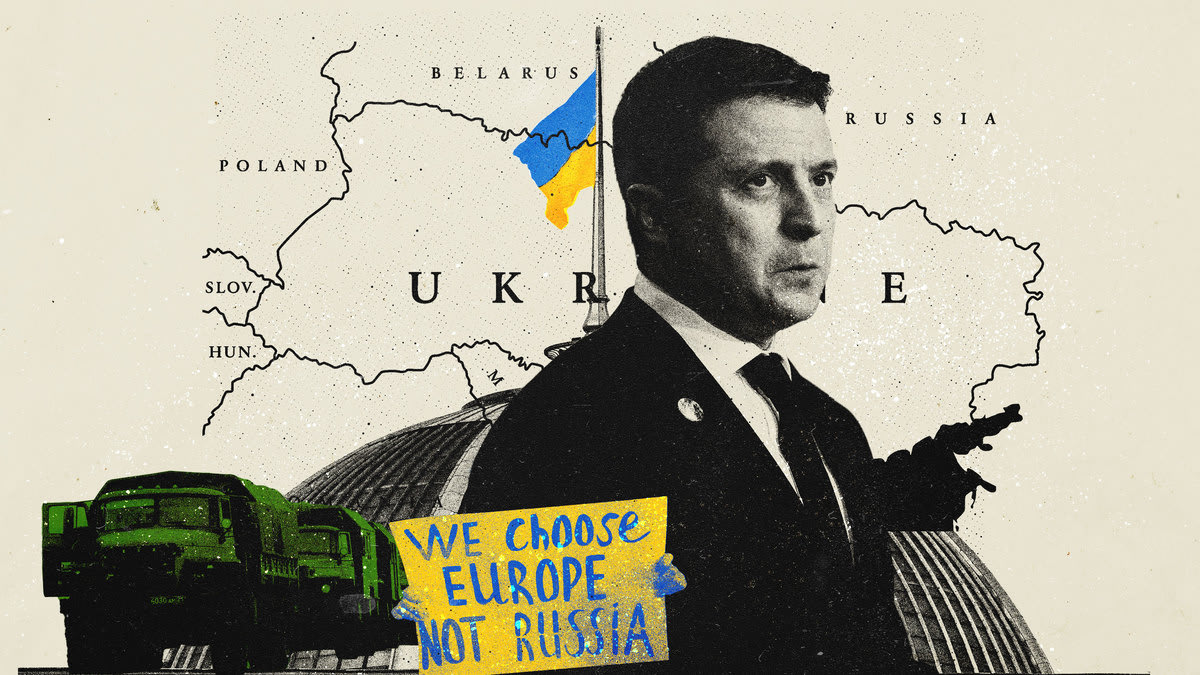KYIV—This is a modern European capital city, and it is in shock. It is being bombed by a tyrant who is desperate to bend a sovereign, democratic country to his will.
The view from the lookout at the iconic St Volodymyr the Martyr Monument in central Kyiv was filled with smoke this week, rising across the Ukrainian capital from the impact of cruise missile strikes.
“At 2 a.m. on Thursday morning, my brother knocked on my door and said I had to be ready to flee in five minutes,” said Sveta Leto, 32, a violinist living in Kyiv. She has escaped with an exodus of refugees to the relative safety of western Ukraine.
Just a few hours later residents of Kyiv and other major Ukrainian cities woke on an overcast, wet Thursday morning to the sounds of cruise missiles smashing targets around their homes. For the first time since World War II, fighter jets engaged in dog fights above a European capital. Russian helicopter gunships poured flares and missiles into their ground targets as Ukrainian anti-air defenses fired back. The only comparisons Ukrainians could make were from war films or video games. “Like Apocalypse Now,” said one. “It’s like Call of Duty,” said another. On Friday afternoon, small arms fire could be heard in the center of Kyiv, the result of a shootout between Ukrainian Army Forces and a Russian saboteur unit that had infiltrated the city.
Ukrainians knew that the day they had prayed would never come, had finally arrived. The Russian attack was not a mere escalation of the war in eastern Donbas—it was a full-scale invasion aimed at destroying the country’s sovereignty.
Ukrainian citizens remain defiant.
On the normally packed central Maidan square, birthplace of 2014’s revolution, there were only two men, both waving Ukrainian flags. One of them, Yurij Segedin, 55, said: “Ukraine is a nation of warriors, and a nation of heroes. We will prevail in this fight as we have prevailed in the past!”
Leto, however, said she had been caught completely unawares. Until the last minute, she hadn’t believed that the war would come. She had returned to Ukraine from a performance in Istanbul just one day earlier, and was organizing a house party this weekend. Despite dire warnings from Western countries in the days leading up to the war, many Ukrainians lived their lives as if everything was completely normal.
Ukrainians have so far been united in their patriotic defense of the country, and most people are reluctant to criticize the government directly now that they have found themselves at war. But when they speak privately, people are complaining that their government didn’t do more—both to prepare them for the possibility of an all-out conflict, and teaching them how to stay safe if war did break out.
As late as two days before the Russian assault began in earnest, Ukrainian President Volodymyr Zelensky was tweeting, “there will be no war.”
One Ukrainian government source admitted that those who listened only to Kyiv’s messaging would have been caught unawares. “The idea that war would happen only came from Joe Biden and Boris Johnson rather than the Ukrainian government,” she conceded to The Daily Beast.
Olesiya Neminska, 37, a cosmetics shop owner from Kyiv, said people had been totally unprepared. “We only learned from the media how to prepare an emergency suitcase, enroll in the territorial defense and how to receive training. Zelensky, on the contrary, argued that there would be no invasion. It was his job to prepare the population for a possible invasion, but he spent most of his presidency fighting his parliamentary opposition.”
Despite the lack of preparations, Neminska remained confident that Ukraine will be victorious. “The Russians will be washed with blood and quickly crawl back into their caves,” she said.
In the metro stations where thousands shelter at night-time, there were a handful of police officers to let people in and out, but there were no visible stocks of food, water, blankets, or any other essentials that sheltering crowds could need. Now, with most shops shut, Neminska is concerned that people will run out of supplies if the war drags on and Kyiv is surrounded and besieged.
With crowds of desperate citizens at the city’s stations, Ukrainians have been left to plan their own evacuation strategies in private vehicles. There has been no sign that the government planned for residents of Kyiv attempting to flee west or is able to assist them in doing so. It is also unclear how they would organize an evacuation of Kyiv if necessary, and none of the residents who spoke to The Daily Beast were aware of such a plan.
This sense of complacency has not been confined to Kyiv. “I think no one prepared, they could have done so many more things in advance. They should have known that somehow this would happen,” said Eva, a 34-year-old actress, living in Mariupol, a city in eastern Ukraine that is currently under Russian siege. When The Daily Beast visited the Donbas region in January there were few signs of increased preparation for warfare. There were no troops or fortifications in the streets, hospitals had no instructions to buy extra supplies or increase capacity.
Last week, in Pavlopil, a small town on the former frontline of the Russian separatists’ war on Ukraine, gunfights could be heard in the distance while children played on seesaws and rode their bikes through the streets of the town. Residents there said that they had not been warned or prepared for any imminent escalation. Just a week before the war erupted, Oleg Budnikov, a 69-year-old farmer, said that they had been promised by local authorities that they would be given evacuation training at some point. But “we got nothing,” he said, adding that there had been no extra preparations despite the months-long military build-up on the Ukrainian border.
Neil Hauer, an expert on the post-soviet region, said “in the better part of a month in Kyiv, I didn’t see any evidence of civilian or humanitarian preparations. The government’s message was that war was not imminent and there was no immediate threat. That is understandable, as they didn’t want to create a panic. I think it gave people a false sense of security because people believed that if anything happened, it would be confined to the east of the country. As a result of that, many people lacked supplies or plans in place for when the war did hit.”

